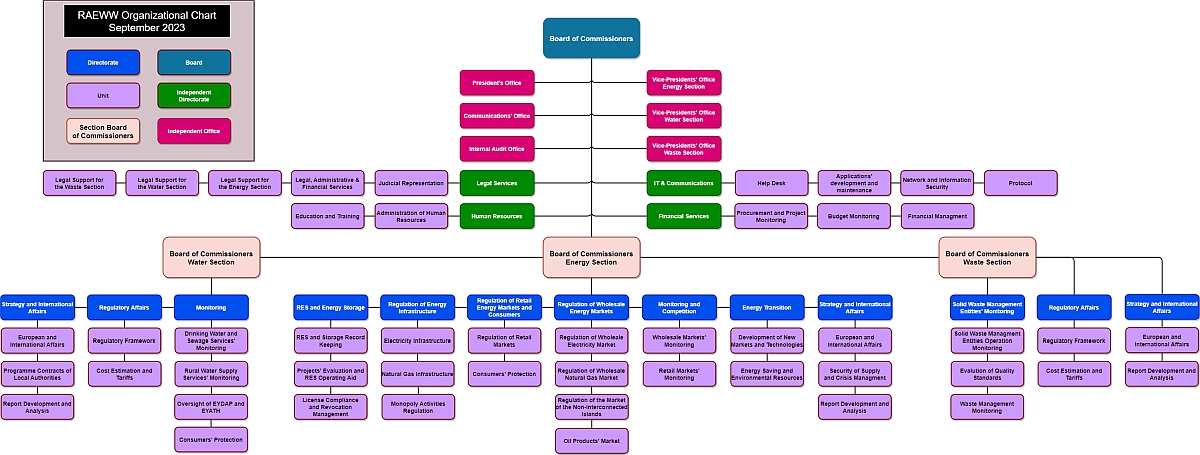Regulatory Authority for Energy, Waste and Water (RAAEY)
Regulatory Authority for Energy, Waste and Water (RAAEY)

Greece
Sectors Regulated:
Electricity, Natural Gas, Renewable Energy Sources, Oil Products, Water, Waste
- Pireos 132
11854 Athens, Greece - +30 210 372 7400
- info-at-raaey.gr
- https://www.rae.gr/en/
Regulatory Authority General Information
- Joined ERRA in 2023
- Established in 1999
Responsibilities
- Legal basis/ mandate
- Regulating the Energy, Waste and Water sectors in Greece. According to the new Law 5037/2023, RAE acquired two new competencies, waste and water, thus renamed as RAAEY. In accordance with Article 5 of Law 4001/2011, the Energy, Waste and Water Regulatory Authority (RAAEY) is established as an independent regulatory body based in Athens. It is a legal entity, functioning independently in legal proceedings related to its actions, omissions, or legal associations. RAAEY answers to parliamentary and judicial control. According to Article 6 of Law 4001/2011, RAAEY has administrative and financial independence. It has its own budget managed with complete autonomy.
- Responsibilities
- Energy:
ꟷ Responsible for monitoring the Security of Energy Supply for both Electricity and Gas sectors;
ꟷ Oversees the implementation of safeguard measures in case of sudden energy market crises or potential risks to individuals, equipment, installation, or Energy Systems’ integrity;
ꟷ Makes decisions on granting, modifying and revoking licenses for conducting Energy Activities;
ꟷ Monitors, evaluates and approves the Network development Plans of Transmission System Operators (TSOs) and Distribution System Operators (DSOs);
ꟷ Defines the methodology for calculating prices for non-competitive activities (use of network tariffs);
ꟷ Determines exemptions for part or all of the capacity of the natural gas system and for interconnections with foreign electricity transmission systems, regarding access provision to third parties or mandatory unbundling;
ꟷ Monitors and oversees energy market operations, implementing regulatory measures for smooth functioning;
ꟷEnsures the application of consumer protection measures is upheld.
Water:
ꟷ Monitors the financial and operational aspects of water and urban waste management services;
ꟷ Monitors and supervises the implementation of general rules and principles for water services and management including water-saving measures, protection zones, security plans and provider obligations;
ꟷ Proposes the tariff methodology for waste services provision;
ꟷ Oversees operational plans and Water Supply Master Plans;
ꟷ Certifies Water Services Providers;
ꟷ Monitors and supervises the continuous, safe, reliable and affordable supply of drinking water to consumers;
ꟷ Monitors economic and financial data from water service providers;
ꟷ Conducts comparative assessments of equivalent water service costs and offers optimization recommendations to underperforming providers;
ꟷ Participates in formulating relevant training and information programs for consumers;
ꟷ Issues draft model regulations for water supply, sewerage and irrigation.
Waste:
Within the scope of supervising and monitoring municipal waste management by stakeholders to ensure efficient and economically beneficial practices by Solid Waste Management Entities (SWME), the Authority:
ꟷ Monitors adherence to tariff regulations;
ꟷ Ensures compliance with SWME’s obligation to pay landfill taxes and can enforce penalties if necessary;
ꟷ Verifies that rehabilitation and after-closure costs are factored into the overall waste service expenses;
ꟷ Assesses the attainment of quality service criteria;
ꟷ Ensures cost-effectiveness by conducting comparative evaluations of equivalent waste management costs provided by SWME and publishes this data on a dedicates website;
ꟷ Recommends the tariff methodology for comprehensive urban waste management to the Ministry of Environment and Energy;
ꟷ Determines minimum quality levels for waste management services supplied by SWME;
ꟷ Provides recommendations, including corrective measures, to be executed within specified time frames if discrepancies in costing and invoicing rules by SWME are identified;
ꟷ Offers guidance and instruction on utilizing energy from waste;
ꟷ Creates an electronic platform for recording SWME costs for local authorities, analyzing costs on a per-ton and per-service basis;
ꟷ Conducts comparative assessments of equivalent waste management costs provided by local authorities, formulating suggestions to streamline relevant fees;
ꟷ Oversees local authorities’ implementation of the pas-as-you-throw (PAYT) system;
ꟷ Evaluates the performance of local authorities in relation to waste management.
- Authorities
- • Independence: Independent regulatory body based in Athens.
- • Supervised by: the Ministry of Energy and Environment; the Ministry of Interior and the Ministry of Rural Development and Food.
- • Reports to: the Parliament.
Organisational Structure
- Organigram

- Internal Structure
- According to the new Law 5037/2023, RAE acquired two new competencies, waste and water, thus renamed as RAAEY. In total it will have 13 Members (1 President, 3 Vice-Presidents and 9 Members). Each of the Vice-Presidents is accountable for overseeing one of the three Boards (Energy, Water and Waste) within RAAEY. Its Members are jointly nominated and put forth for examination to the Committee on Institutions and Transparency of the Hellenic Parliament by the Ministers of Environment and Energy, Interior, and Rural Development and Food, If the Committee expresses a favorable opinion, the nominees are officially designated to their respective positions through the Ministerial Council Decision for 5 years. Their term is renewable once. Currently only the energy sector is active.
- Working Employees
- • Decision-Making Level: 13
- • Total Number of Employees: ~100
- Budget
- Has its own budget managed with complete autonomy. (a) Market Fees (b) Grants, subsidies, grants, research project funding and any other income from the European Union and international organisations (c) revenue from imposed fines (d) A percentage of the landfill tax (e) A percentage of the annual turnover of water service providers, excluding water improvement agencies.

